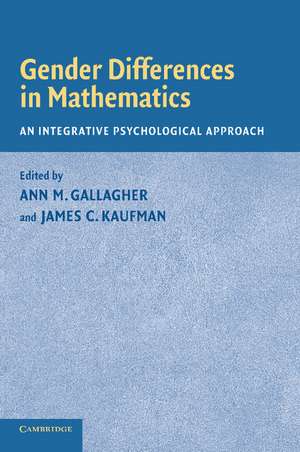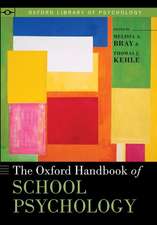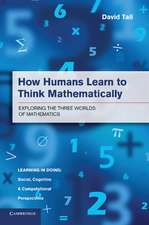Gender Differences in Mathematics: An Integrative Psychological Approach
Editat de Ann M. Gallagher, James C. Kaufmanen Limba Engleză Paperback – 16 ian 2005
| Toate formatele și edițiile | Preț | Express |
|---|---|---|
| Paperback (1) | 333.68 lei 6-8 săpt. | |
| Cambridge University Press – 16 ian 2005 | 333.68 lei 6-8 săpt. | |
| Hardback (1) | 413.65 lei 6-8 săpt. | |
| Cambridge University Press – 26 dec 2004 | 413.65 lei 6-8 săpt. |
Preț: 333.68 lei
Nou
Puncte Express: 501
Preț estimativ în valută:
63.85€ • 66.84$ • 52.83£
63.85€ • 66.84$ • 52.83£
Carte tipărită la comandă
Livrare economică 05-19 aprilie
Preluare comenzi: 021 569.72.76
Specificații
ISBN-13: 9780521533447
ISBN-10: 0521533449
Pagini: 368
Ilustrații: 17 b/w illus. 11 tables
Dimensiuni: 177 x 230 x 20 mm
Greutate: 0.5 kg
Editura: Cambridge University Press
Colecția Cambridge University Press
Locul publicării:New York, United States
ISBN-10: 0521533449
Pagini: 368
Ilustrații: 17 b/w illus. 11 tables
Dimensiuni: 177 x 230 x 20 mm
Greutate: 0.5 kg
Editura: Cambridge University Press
Colecția Cambridge University Press
Locul publicării:New York, United States
Cuprins
Preface; 1. Research on the women and mathematics issue: a personal case history Susan Chipman; 2. The perseverative search for sex differences in mathematic ability Paula Caplan and Jeremy Caplan; 3. A psychobiosocial model: why females are sometimes > and sometimes < males in math achievement Diane Halpern, Jonathan Wai and Amanda Saw; 4. Gender differences in math: cognitive processes in an expanded framework James Byrnes; 5. Cognitive contributions to sex differences in math performance James M. Royer and Laura M. Garofoli; 6. Spatial ability as a mediator of gender differences on mathematics tests: a biological-environmental framework M. Beth Casey, Ronald Nuttal and Elizabeth Pezaris; 7. Examining gender-related differential item functioning using insights from psychometric and multicontext theory Rob Ibarra; 8. The gender-gap artifact: women's underperformance in quantitative domains through the lens of stereotype threat Paul Davies and Steve Spencer; 9. 'Math is hard!' (Barbie, 1994): responses of threat vs challenge mediated arousal of stereotypes alleging intellectual inferiority Talia Ben Zee, Cristina M. Carrasquillo, Alison M. L. Ching, Tattiya J. Kliengklom, Kristen L. McDonald, Daniel C. Newhall, Gillian E. Patton, Tiffany D. Stewart, Tonya Stoddard, Michael Inzlicht and Steve Fein; 10. The role of ethnicity on the gender gap in mathematics Alyssa Walters and Lisa Brown; 11. The gender gap in mathematics: merely a step function Sophia Catsambis; 12. 'I can, but I don't want to': the impact of parents, interests, and activities on gender differences in math Janis E. Jacobs, Pamela Davis-Kean, Martha Bleeker, Jacquelynne S. Eccles and Oksana Malachuk; 13. Gender effects on mathematics achievement: mediating role of state and trait self-regulation Eunsook Hong, Harold O'Neil and David Feldon; 14. Gender differences in mathematics self efficacy beliefs Frank Pajares; 15. Integrative conclusion Ann Gallagher and James Kaufman.
Recenzii
'Here is an intense, interesting book. It is provocative, stimulating and frustrating.' Psychologist
Descriere
This book explores gender differences in math performance.




















